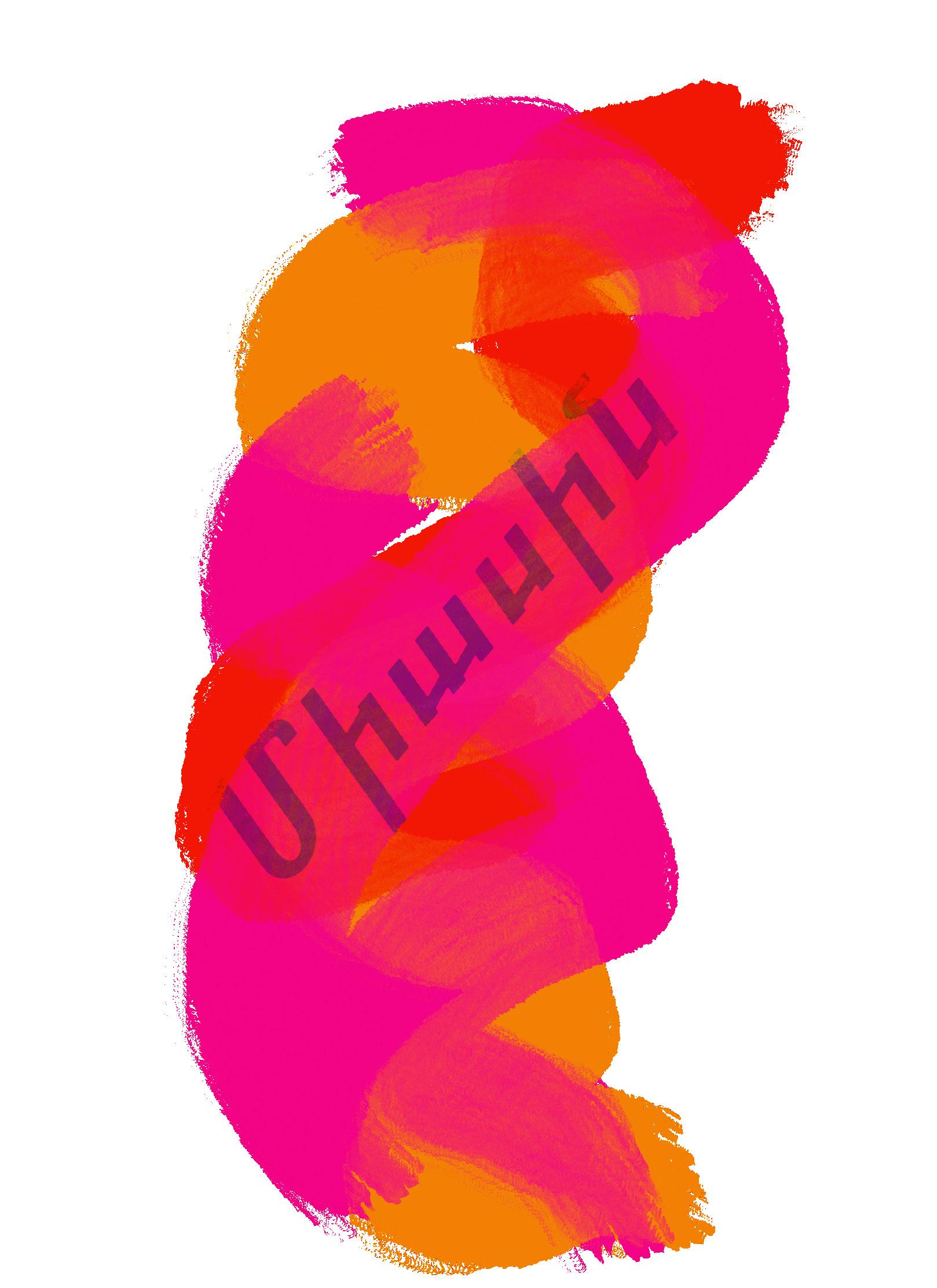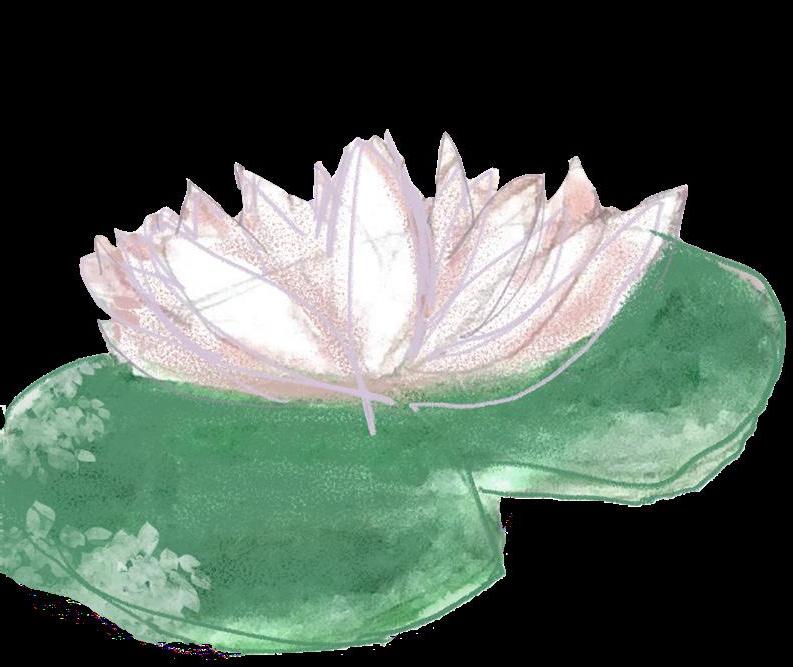
9 minute read
Silence
One, two, three. Silence. One, two, three. For three seconds, the world wound itself around the breaths of a dying fowl. The violent upheaval of its chest continued like clockwork, sporadically devouring its three seconds, only to lull to the silence shortly after. Stillness passed, only for the bird to once more be consumed by its desperate will to continue. One, two, three. Its black eyes were hollowed with irremediability. Up, down, shaky breath, silence. One, two, three. Nothing. Lumpy, matted clumps of feathers pointed to a gash on its chest. Claw marks. The frail body lay astrew, its wing disheveled, its torso blood ridden. I wrapped the bird in a small paper towel, blood slick like oil staining my fingers. For an instant, I felt the weak flit of its wings against my palm. Once more, and then its body collapsed into silence. My fingers became host to a periodic fight against breath, a one, two, three. The small figure lent me its warmth, my hands tingling with the sensation of energy fighting its own cessation.
I cupped its body, walking to my garage. I placed it down on the concrete grounding, the spidering cracks in the floor supporting the makeshift paper towel bed. Stiffness crept up the small figure, its talons tensing, its wings stilling, its breath tightening. I ran inside, searching for anything to counteract the all-consuming, three-beat quiet. Instead, I found my mom. I led her outside to my rapidly dissipating being. There, we were met with an empty white paper towel. Left behind was only the riddling of three blood drops. One, two, three.
Advertisement
“What if no one ever wants to know me?” One dreary night in March, I found myself in our college apartment facing the musings of my roommate in the midst of a global pandemic. The dim glow of fairy lights dotted our walls, with an ugly, black leather couch pressed against the wall. An old TV sat across from the black couch, with a wooden table dividing the cramped walkway.
“No one wants to get to know you?” I laughed. It was a weird dismissal that felt more comfortable than searching for the words I didn’t have. I glanced over at her, hidden in our sunken, yellowed armchair. Her wiry arms shot up in exasperation, her head falling back. Wren was like a fawn, her slender neck extending gracefully into her jawline. Her iron eyes overwhelmed, always distant, always edging the cusp of wandering too far. She locked eyes with me. I wonder what she saw. My mundane, black eyes had a tendency of losing everyone that peered in. Quickly, a remote expression paralyzed her face.
“Aren’t you scared? No one ever knowing you?” she questioned.
My response was instant, the words quickly shot up my throat, a reckless, violent cannon of ideas now encircling our silence. “Sometimes there’s just nothing to know.”
For a month, I found myself mourning the words I didn’t have. Our three-room apartment closed us in, with only our shared bedrooms and a living room to migrate to and from. Quarantine for COVID-19 seemed to dig in its heels, further entrenching us into a familiar lull of isolation. Everyday seemed to follow an odd regimen: wake up, shower, study, homework, quiet, then sleep. Our apartment was generally home to noise. Online lectures pervaded our everyday, pans rang while cooking on our gas stove, and the conversations of our roommates and friends echoed off our walls. Yet, it was in our moments of quiet where we created space for ourselves, for variance, for wandering. We spent these moments together, finding ourselves on our couch, wine warming our bellies as we strung words into memories.
“I hate men,” Wren said one Saturday.
I looked over, a grin breaking into my face. “Yea? Me, too. Guys fucking suck.”
She sighed through wine-washed teeth, her face illuminated by the dull glow of a phone screen. She stopped scrolling abruptly and turned her phone towards me. “Look.” Her slowed, drunken breath glazed the air as she awaited my assessment. I scanned the photo, which showed only a chest. Olive-toned skin stretched over sharp collarbones, from which a strong neck shot upward. It was Wren. Only, the olive skin of her neck was dotted purple, dots multiplying SILEN into splatters of blues and purple bruising her chest.
“What happened?” I asked.
She looked back. “I don’t remember. Men happened.” My eyes scoured hers. Her green iron eyes glinted with hurt only for a moment, only to be replaced with a keen cognizance of my examination moments later. Her palms rested on her ribs, her hands clutched around her body.
“Are you okay?” I asked, my words far and unreaching. She continued scrolling aimlessly through her phone, my question fizzling into the silence.
Our days marched on, blanketed with the ordinary. Days bled into weeks as our routines intertwined with one another. Wake up, shower, study, homework, quiet, and sleep. “Will we ever get out of here?” I asked Wren one night, nestled into the cushions of our couch.
She swirled her glass intermittently. “Not any time soon.” After the silence, she smiled, promptly before disappearing into her room. She returned with a small baggie, no larger than the size of her thumbs, with which she signaled a thumbs up. “Want to?” she offered.
“I’m okay, but I want to know how it feels. Tell me, and it’s a maybe for later,” I responded through slurred words. She nodded in agreement, Clorox-wiping our table before tapping the powdery white substance out. She swept her credit card E through the substance, dividing it into three crooked lines. She bent over, a sharp breath in—when she stood up, the powder was gone, snuffed away. Her brown hair draped messily over her eyes, and her soft pink nose reddened. I looked at her, her eyes emboldened, a new sense of presence overtaking her. A night of endless NCE stories ensued. I had never heard Wren talk for so long. I never knew how her voice sounded wrapped around the climax of an old memory or in the uprooted laughter once deep-seeded in her belly. She looked at me, staring through me. Her eyes bulged with a contrived sense of intimacy, the gleam of her eyes dimmed and remote.
“I missed talking to you,” Wren said, her cheeky smile overtaking her cheeks.

“I miss you, too, Wren.”
Our days looked a little different from that day onward. Our routine welcomed a new guest, a growing pile of white powder. Small baggies collected in our garbage, and Wren seemed further subdued, softened by soft powder. Her olive skin paled, her body thinning from anxiety and her newly suppressed appetite.
A month passed, and I found myself in the same sunken seat of our yellow armchair, Wren cutting up again, the tap, tap, tap, one, two, three of her card hitting the table. “See you soon,” she said. Her head quickly resurfaced, a white powder covering the septum of her nose. She looked at me, her eyes glassy and her face paled. She rocked back and forth with no words.
“How are you feeling?” I asked.
Wren shifted her face towards me, her eyes empty. I studied at her, waiting for the onslaught of this Wren, the one who found it easier to be known at a distance. Silence embedded itself into the gaps where I looked for her. I searched my mind for ways to coax this quiet. Abruptly, the whites of her eyes voicelessly shrieked, rolling violently to the back of her head. Her arms stiffened, spasmodically beating against her chest. All the while, silence levied itself in the air, winding itself around Wren’s strained breaths. One, two, three.
“Wren, please, oh my God, Wren, please.”
One, two, three, silence.
An hour lapsed before she woke up in the emergency room of the children’s hospital. I refused to leave her, even to go to the bathroom. I feared if I left, I would come back to an empty room. The walls were a sterile white, wires spidering themselves up the confines of the room. I stared at her in desperation, hunched forward in my seat. She weakly looked back, glancing downwards at the chalky blanket which enveloped her.
The resident doctor came in, briefing her for details. “What substances did you ingest? How long was the seizure? Have you experienced seizure-like activity before? Do you have issues with substance abuse?” Methodically, Wren travelled down the list, satisfying the resident doctor enough for him/her to leave shortly after.
She leaned back in the small hospital bed, white paper crinkling beneath her as she shifted in her spot. Silence swaddled the room as we waited. I sat determinedly, for this time I would find the words I had struggled with before. Wren held her palm against her chest, her fingers whitened with the weight she applied against herself. She took a sharp breath, silence shattering like glass in the room. “When I was gone, when I was seizing, I wasn’t there. I was somewhere else,” Wren said. Her eyes gathered wells, glimmering in the droplets dragging down her face. “I didn’t feel like I was here. You guys were watching. I was with him.” She clutched her mouth as her chest violently heaved. Her choked sobs ricocheted off the white walls of our small room. And so I held her, her body trembling against my own. “I felt his hands on me. I will never not feel his hands on me.” Her eyes, once hollowed with irremediability, glinted in redress to her untimely return. For once, I stared back resolutely.
By Nayri Carman
The first fog of death slinks through the village death seeps into rivers, wilting and writhing until painted with ribbons of ruby pomegranate wine Bitterly blended with baptismal blood. Sasoun is next.

We gather in traditional white dance clothes. We link pinkies and surround the young drummer boy. He sets the beat with small palms on soft calfskin We begin our dance: the dance of the Armenians. We hear the song of our ancestors. We taste the hamov hodov khorovadz and medzmama’s kufte Sweet and tangy spices bubbling on our tongues. We feel the kiss of our mothers on freshly stubbled cheeks And the anticipation of an overturned cup of soorg a book in coffee grounds, waiting to be read. We hear the melody of our language: soft rolling r’s of gently sprawling mountains harsh kh cuts in jagged stone of monasteries carved from cliffs where G-d’s voice soars and sings. It flows, sonorous in our ears, propelling our dancing feet welding together our pinkies. Together in dance is the last place our hands will be.

The air ignites. The bullets are screaming. White is seeping red. The first of us is falling. Her neighbors are holding her up. Her corpse is dancing. Her death, defiant.
Calf skin has broken. Small palms have fallen. We have breathed the fog of death. Gunshots have chosen a new rhythm.
In life, we have fallen. In death, we have risen. Together.
“Together” is the story of the village of Sasoun during the Armenian Genocide, who, when the inhabitants learned that the Turks were coming to kill them, all donned their traditional Armenian dance clothes and began the dance of their village. It was too late for them to escape, but they would leave on their own terms, pinkies clasped as is traditional in Armenian dance, passing on together.
[miasin ] armenian, meaning “together”











